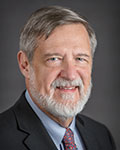
Louis P. Garrison, Jr., PhD, is Professor in the Pharmaceutical Outcomes Research and Policy Program in the School of Pharmacy, and Adjunct Professor in the Departments of Global Health and Health Services at the University of Washington, where he joined the faculty in 2004. He also co-directs the Global Medicines Program in Global Health.
Dr. Garrison’s career began with 13 years in non-profit health policy research at the Battelle Human Affairs Research Centers (Seattle), and at the Project HOPE Center for Health Affairs (Virginia), where he was the Director from 1989-1992. Following this, he worked as an economist in the pharmaceutical industry for 12 years. From 2002-2004, he was Vice President and Head of Health Economics & Strategic Pricing in Roche Pharmaceuticals, and was based in Basel, Switzerland.
Dr. Garrison received a BA in Economics from Indiana University, and a PhD in Economics from Stanford University. He has more than 100 publications in peer-reviewed journals. His research interests include national and international health policy issues related to personalized medicine, benefit-risk analysis, insurance, pricing, reimbursement, and risk-sharing agreements, as well as the economic evaluation of pharmaceuticals, diagnostics, devices, surgical procedures, and vaccines, particularly as related to organ transplantation, influenza, measles, obesity, and cancer.
From 2007-2009, Dr. Garrison served on the ISPOR Board of Directors. He co-chaired two ISPOR Good Practice Task Forces—on Real-World Data and on Performance-Based Risk-Sharing Arrangements, and he chaired the ISPOR Health Science Policy Council from 2012 to 2015. He is faculty advisor for the UW ISPOR Student Chapter, and is ISPOR President-elect for 2016-17.
ISPOR Vision Statement by Lou P. Garrison, PhD
The growth in numbers and the geographic and disciplinary diversity of ISPOR over the past 20 years has been phenomenal, owing to the vision and energy of our founding executive Dr. Marilyn Dix Smith, who is leaving ISPOR with strong new leadership, a superb staff, and a solid financial foundation.
Entering this transitional period, it will be critical for the new Executive Director, the President, and the Board of Directors to complete the Vision 2020 Initiative. It is also an opportune time to address whether and how we can ensure that key ISPOR staff are retained and expanded, as needed, to support our growing global scientific enterprise.
I fully support ISPOR’s current mission and vision, and, if elected, would prioritize my efforts in three areas: 1) supporting our regional chapters and global network to expand capacity in outcomes research, 2) continuing to improve the science of outcomes research through our task forces and journals, and 3) outreach for collaboration with our sister organizations – HTAi, DIA, AMCP, SMDM, IHEA, and others – and with public and private decision-makers. Serving on a payer value assessment committee, I have seen how the evidence we produce can be used for more efficient and equitable healthcare decision-making.
As chair of the ISPOR Health Policy Council, and co-chair of two task forces, I have witnessed the selfless commitment of our members to the development and dissemination of good research practices in the name of science and improving population health; and, like others, I have travelled widely to help build regional capacity.
I am extremely grateful for the opportunities that ISPOR has given me over the past 20 years. I would be highly honored to serve as ISPOR President with the aim of making those opportunities available to all of our global ISPOR community in the coming years.
